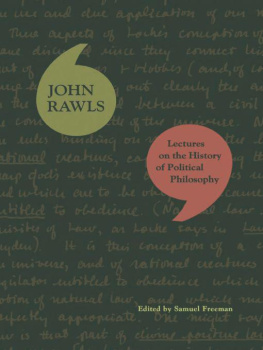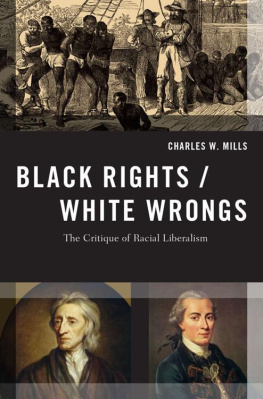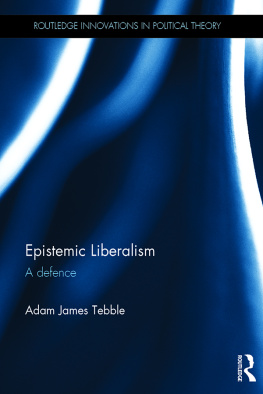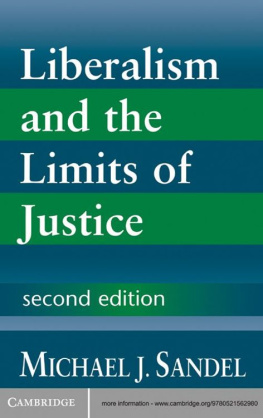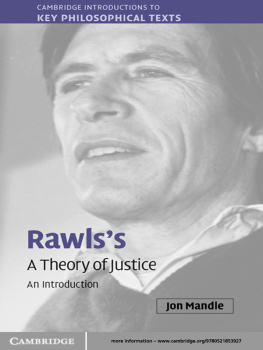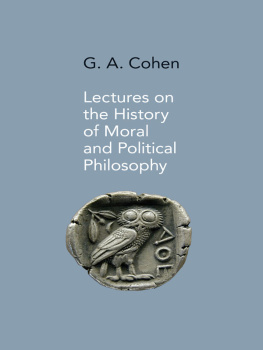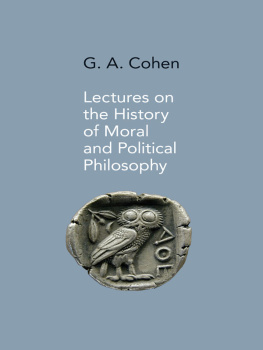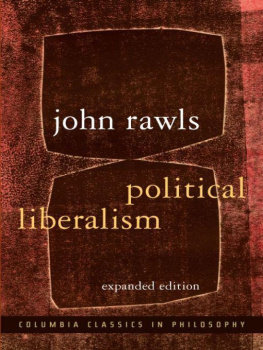Table of Contents
Copyright 2007 by the President and Fellows of Harvard College
All rights reserved
Printed in the United States of America
First Harvard University Press paperback edition, 2008.
Library of Congress Cataloging-in-Publication Data
Rawls, John, 1921-2002.
Lectures on the history of political philosophy / John Rawls ; edited by Samuel Freeman.
p. cm.
Includes bibliographical references and index.
ISBN 978-0-674-02492-2 (cloth : alk. paper)
ISBN 978-0-674-03063-3 (pbk.)
1. Political sciencePhilosophyHistory. I. Freeman, Samuel Richard. II. Title.
JA71.R297 2007
320.01dc22 2006050934
To my students
JOHN RAWLS
Editors Foreword
THESE LECTURES derive from John Rawlss written lectures and notes for a course in Modern Political Philosophy (Philosophy 171) that he taught at Harvard University from the mid-1960s until his retirement in 1995. In the late 1960s and 1970s Rawls would teach his own theory of justice, justice as fairness, in conjunction with other contemporary and historical works. For example, in 1971 he taught, in addition to A Theory of Justice, works by Locke, Rousseau, Hume, Berlin, and Hart. Later in the 1970s and early 1980s this course consisted entirely of lectures on most of the major historical political philosophers in this volume. In 1983, the last year he taught historical figures alone without A Theory of Justice, Rawls lectured on Hobbes, Locke, Hume, Mill, and Marx. In earlier years Sidgwick would often be discussed (1976, 1979, 1981), as would Rousseau, but in that case Hobbes and/or Marx would not be discussed. In 1984 Rawls again taught parts of A Theory of Justice in conjunction with Locke, Hume, Mill, Kant, and Marx. Soon thereafter he dropped Kant and Hume from his political philosophy course, and added the lectures on Rousseau. During this period he wrote final versions of the lectures presented here on Locke, Rousseau, Mill, and Marx, along with the lectures that were published in 2000 as Justice as Fairness: A Restatement. (This explains the occasional comparisons with justice as fairness found in the present lectures.) Since they were regularly taught during the last ten to twelve years of Rawlss teaching career, the lectures in this volume on Locke, Rousseau, Mill, and Marx are the most finished and complete. Rawls typed them into computer files and adjusted and refined them over the years, until 1994. As a result, they required very little editing.
Somewhat less finished are the earlier lectures on Hobbes and Hume from 1983. They do not appear to have been written out as a continuous and complete set of lectures (with the exception of most of the first Hume lecture). The Hobbes and Hume lectures presented here were mainly derived from transcriptions of recording tapes of Rawlss lectures for that term, which have been supplemented by Rawlss handwritten lecture notes and class handouts. Rawls typically provided students with summaries that outlined the main points in his lectures. Prior to the early 1980s (when he started typing his lectures on a word processor), these handouts were handwritten in a very fine script which, when typed out, filled more than two single-spaced pages. These handouts have been used to supplement the lectures on Hobbes and Hume, and they also provide most of the content of the first two Sidgwick lectures in the Appendix.
One great benefit of these lectures is that they reveal how Rawls conceived of the history of the social contract tradition, and suggest how he saw his own work in relation to that of Locke, Rousseau, and Kant, and to some degree Hobbes as well. Rawls also discusses and responds to Humes utilitarian reaction to Lockes social contract doctrine, including Humes argument that the social contract is superficial and an unnecessary shuffle (Rawls), an argument that established a pattern of criticism that continues down to the present day. Another substantial benefit of this volume is Rawlss discussion of J. S. Mills liberalism. It suggests many parallels between his own and Mills views, including not just the palpable similarities between Mills principle of liberty and Rawlss first principle of justice, but also the less tangible parallels between Mills political economy and Rawlss account of distributive justice and property-owning democracy.
The Marx lectures evolved perhaps more than others over the years. In the early 1980s Rawls endorsed the position (held by Allen Wood, among others) that Marx did not have a conception of justice but rather regarded justice as an ideological concept necessary to sustain the exploitation of the working class. He revises that position in the lectures included here, under the influence of G. A. Cohen and others. Rawlss interpretation of Marxs Labor Theory of Value seeks to separate its outmoded economics from what he regards as its main aim. He construes it as a powerful response to the Marginal Productivity Theory of Just Distribution and other classical liberal and right-wing libertarian conceptions which regard pure ownership as making a tangible contribution to production. (See Marx, Lecture II.)
Rawlss lectures on Bishop Joseph Butler and Henry Sidgwick were not left as finished as the other lectures in this volume. Nonetheless, he agreed to their publication shortly before he died in November 2002, and they have been included in the Appendix to this volume. Rawls taught Sidgwick for a number of years (including 1976, 1979, and 1981) in his political philosophy course, along with Hume and J. S. Mill, to give students an idea of the works of (what he regarded as) the three major utilitarian philosophers. He saw Sidgwick as the culmination of the classical utilitarian tradition that began with Bentham. He also regarded Sidgwicks comparative method in The Methods of Ethics as providing a pattern for moral philosophy to emulate. The first two Sidgwick lectures included here were for the most part taken from the handwritten notes that Rawls duplicated and handed out to students. He used these handouts as his lecture notes, and then elaborated upon them orally when delivering the lectures. For this reason, the first two Sidgwick lectures cannot be considered by any means complete lectures. The third lecture on Sidgwick (1975) goes over some of the same material as in the brief discussion of utilitarianism in Sidgwick, Lecture II, but discusses in much more detail the assumptions and implications of the classical utilitarian position. There is a good deal of material on utilitarianism in this lecture and in the brief fourth lecture (1976) that is not available in any of Rawlss other published discussions of utilitarianism in A Theory of Justice, Social Unity and Primary Goods, or elsewhere.
The five lectures on Butler were among Rawlss handwritten papers. These lectures were used in Rawlss course on the history of moral philosophy in the spring of 1982, when he also taught Kant and Hume. Rawls thought that Butler provided the major non-utilitarian response to Hobbes by an English philosopher. He also regarded Butler as among the major figures in modern moral philosophy. Among Rawlss handwritten notes to himself (not incorporated into the lectures themselves) is the following: Important Points in Butler: (Hobbes and Butler, the two great sources of modern moral philosophy: Hobbes as posing the problemthe writer to refute. Butler supplied a deep answer to Hobbes). In addition, Rawls found some connection between Kants and Butlers doctrine of conscience, and this perhaps provided Rawls with grounds for believing that Kants non-naturalistic, non-intuitionistic account of morality was not peculiar to German Idealist philosophy. Finally, the Butler lectures are suggestive of the central role that the idea of a reasonable moral psychology had in Rawlss conception of moral and political philosophy. (There are parallels in the lectures on Mill and Rousseau too.) One of the main ideas behind Rawlss work is that justice and morality are not contrary to human nature, but rather are part of our nature and indeed are, or at least can be, essential to the human good. (See A Theory of Justice, chapter 8, The Sense of Justice, and chapter 9, The Good of Justice.) It is noteworthy that Rawlss discussion of Butlers reconciliation of moral virtue and self-love parallels Rawlss own argument for the congruence of the Right and the Good.

